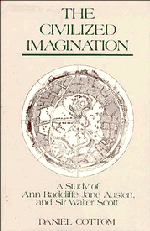1 - Introduction: Of taste and the civilized imagination
Published online by Cambridge University Press: 06 August 2010
Summary
An unedified palate is the irrepressible cloven hoof of the upstart.
– PARSON SWANCOURT IN THOMAS HARDY'S A Pair of Blue EyesVirtually all eighteenth-century writers on aesthetics direct their arguments against certain popular proverbs: Chacun à son goût, De gustibus non est disputandum, and so on. In an age being nudged toward relativistic postulates by the doctrine of association in psychology, the beginnings of a modern historical consciousness, and the popularization of comparative anthropology in fictional works like The Persian Letters as well as in nonfictional accounts of voyages and travels, these writers find it all the more necessary to insist on a universal standard of taste. It has been noted by Bernard Bosanquet, among others, that even so notorious a skeptic as Hume is unable to believe that the perceptions of different people might be completely incommensurable in the terms of aesthetic judgment. Though Hume begins one of his essays on taste by agreeing with proverbial wisdom – “common sense, which is so often at variance with philosophy, especially with the skeptical kind, is found, in one instance at least, to agree in pronouncing the same decision” – he concludes by asserting that “amidst all the variety and caprice of taste, there are certain general principles of approbation or blame, whose influence a careful eye may trace in all operations of the mind.”
- Type
- Chapter
- Information
- The Civilized ImaginationA Study of Ann Radcliffe, Jane Austen and Sir Walter Scott, pp. 1 - 32Publisher: Cambridge University PressPrint publication year: 1985



